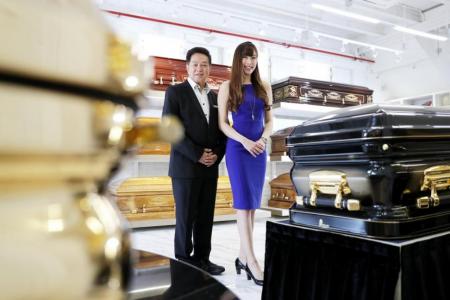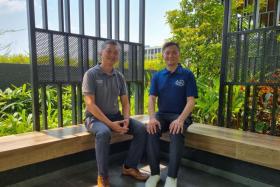Evolving her father's funeral business
Since taking over the business in 2014 from her father, famed undertaker Roland Tay, Jenny Tay has turned Direct Funeral Services (DFS) into a professionally run business "with a heart".
And it's no secret where she inherits that compunction from. For as long as Ms Tay can remember, her father has been well known - and he still is - for his compassion and generosity. Mr Tay, now 71, routinely arranges funerals - many at his own cost - for the elderly poor, the needy, and victims of accidents and crime.
Echoing her father's staunch belief, Ms Tay, 31, says the same standard of service should be "accorded to all levels of the community, whether rich or poor".
DFS is but one of 200 enterprises in Singapore making a living from people dying. Speaking from her showroom in Geylang Bahru, Ms Tay says: "Many people tend to think that this is a lucrative business, even during the economic downturn. After all, nothing is certain but death and taxes, right?
"But that's not true. Some clients may go for the more elaborate packages and default on payment later. Others request for instalment payment when they discover that they were unable to pay. The death business is just like any other business."
But also, as with other businesses, there is potential for growth. Since taking over the management three years ago, Ms Tay has tripled the company's revenue from S$2 million to S$7 million a year according to the 2015 audited numbers.
DFS now handles an average of 100 to 120 cases a month (that's an average of three to four funerals a day). Pricing for its basic funeral packages has remained the same for the past 10 years. But it wasn't easy. With a father who is well respected among practitioners in the industry, Ms Tay had to prove her mettle.
"I've been working very hard to maintain the business - constantly bringing in new innovative elements and upgrading our services, not just for the company, but for the industry - all so I can create a legacy for my father," she says.
"I'm not afraid of competition. It encourages improvement across the industry. In the last two years, other funeral companies are also offering additional services and more transparent packages," she adds.
Not wanting to change the entire business DNA built by her father, Ms Tay says she is "merely building upon it". She and her husband Darren Cheng, 32, have also moved the company forward with the times, introducing employment benefits, career progression and better accreditation to the industry.
"When I took over, we observed and worked the ground with our staff for about a year, before making changes. It's very important to do things gradually. Nobody's going to listen if you come in with guns blazing and demanding immediate change," she says.
To give her staff a more professional look, she ditched the polo-tee-and-jeans outfit from before and replaced it with a shirt-and-vest uniform. She also developed an in-house iPad app that allows the funeral directors to schedule funerals and send orders to the head office.
"Previously, funerals were all very haphazardly done. The rites were carried out by someone dressed casually, reading off a script and directing mourners through the motions in an offhand manner.
"I always believe that funerals should be conducted with dignity. Anyone would want that for a loved one who has passed on.
"While we continue to hold on to the traditions, the rites and rituals, we also offer new services to better meet customers' evolving needs."
The industry's hiring practices have changed too. Her father had insisted on hiring "ready made" workers with experience, not newbies.
"He used to tell me that it was very hard to find young workers my age and that no young person would want to be in this business. He said it would be easier to attract those already in the business with higher salaries, but I beg to differ," she says.
"Today, I see a lot more younger people keen to join the funeral business, especially more women. My emphasis is education. If you have the right education to prepare you for this service, then you would not hesitate to be part of it."
She says DFS receives about two to three applications a week from fresh graduates or millennials wanting to make a career switch.
"This is a huge jump from three years ago when we would get one applicant in three months," she says, adding that the same is happening with other funeral services companies. DFS and its group of companies (including specialist businesses such as Hindu Casket) now have about 65 staff.
To ensure that there is continual training, her company has rolled out a management trainee programme to help train and retain potential employees.
She has also taken a page from the book of Japanese and Taiwanese funeral directors by engaging professional masters of ceremonies (MCs) to give eulogies at funerals.
"As Chinese, many of us are not articulate when it comes to expressing our feelings towards a loved one, particularly one who had just passed on. We have these MCs to speak on their behalf and this was well received by many of our clients.
"Death is an important part in a person's life. It is the final leg. So, instead of mourning the loved one's passing, why not celebrate his or her life? If we're paying so much attention to the details of a wedding or the birth of a baby, why can't we do the same for a wake?
"The technical know-how of conducting a funeral can be taught. But it's nothing without the right attitude and sincerity - the two most important things in this business."
In the last 40 years, Roland Tay has handled the funerals of some of Singapore's most high-profile murder victims - pro bono. They include eight-year-old Chinese national Huang Na, whose tiny, decomposing body was found stuffed into a cardboard box, and 22-year-old Chinese national Liu Hong Mei, whose dismembered remains were found in Kallang River.
Says Ms Tay: "Stories about his pro bono cases always struck a chord in me. Although he has handed the business over to me and Darren, he hasn't fully retired. He still handles the pro bono cases - something he is very passionate about."
But Ms Tay, her husband and her father never see charity as a requisite to chalk up Corporate Social Responsibility (CSR) points.
"It comes from our heart when we try to help, even if that means doing pro bono work," she says.
"When you look at it holistically, funerals are about being part of a community. In that sense, we are providing an essential service and not a business per se. We serve families and clients in one of their most vulnerable moments and this makes what we do very important."
Get The New Paper on your phone with the free TNP app. Download from the Apple App Store or Google Play Store now



